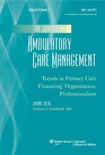
JOURNAL OF AMBULATORY CARE MANAGEMENT
Scope & Guideline
Shaping the future of healthcare with evidence-based research.
Introduction
Aims and Scopes
- Care Coordination and Chronic Disease Management:
The journal emphasizes research on effective care coordination strategies, particularly for chronic disease management, addressing the complexities faced by patients and healthcare providers. - Community Health Worker Integration:
A significant focus is on the role of community health workers (CHWs) in bridging gaps in healthcare delivery, enhancing patient engagement, and addressing social determinants of health. - Telehealth and Technological Innovations:
The journal explores advancements in telehealth and other technological innovations that improve access to care, particularly in underserved populations. - Social Determinants of Health:
Research published in the journal frequently addresses how social determinants impact health outcomes, advocating for comprehensive approaches to healthcare that include social factors. - Health Equity and Access:
There is a consistent focus on health equity, particularly in relation to marginalized populations, ensuring that research addresses barriers to access and disparities in health outcomes. - Interprofessional Collaboration:
The journal promotes studies on interprofessional collaboration among healthcare providers to enhance patient care and improve health service delivery.
Trending and Emerging
- Integration of Social Services and Health Care:
There is a growing emphasis on integrating social services with healthcare, recognizing that addressing social determinants is crucial for improving health outcomes. - Mental Health and Well-Being:
Research focusing on mental health within ambulatory care settings is increasing, highlighting the importance of addressing mental health as part of comprehensive patient care. - Patient Engagement and Activation:
Emerging themes include strategies for enhancing patient engagement and activation, ensuring that patients are active participants in their healthcare decisions. - Advanced Team-Based Care Models:
The trend towards advanced team-based care models is gaining traction, emphasizing collaborative approaches to managing patient care across various healthcare disciplines. - Impact of COVID-19 on Healthcare Delivery:
Ongoing research on the long-term impacts of the COVID-19 pandemic on healthcare delivery models and patient care practices remains a significant area of interest. - Health Technology and Data Utilization:
Increasing focus on the utilization of health technology and data analytics to improve care processes and patient outcomes is becoming more prevalent in the journal's publications.
Declining or Waning
- Traditional Models of Care:
The decline in research focused solely on traditional models of ambulatory care suggests a shift towards more innovative and integrated approaches that consider the broader context of patient needs. - In-person Care Delivery:
As telehealth and virtual care have surged, there has been a noticeable decrease in studies exclusively addressing in-person care delivery models. - Single-Factor Health Interventions:
Research focused on single-factor interventions without considering the multifaceted nature of health determinants is becoming less common, as more comprehensive approaches gain favor. - Crisis Management in Healthcare:
While still relevant, the focus on crisis management related to specific events (like the COVID-19 pandemic) is waning as the journal increasingly emphasizes sustainable, long-term solutions. - General Health Policy Discussions:
Discussions centered solely on broad health policy without specific application to ambulatory care settings are being replaced by targeted research that directly impacts outpatient practices.
Similar Journals
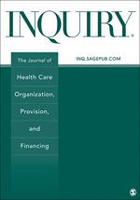
INQUIRY-THE JOURNAL OF HEALTH CARE ORGANIZATION PROVISION AND FINANCING
Advancing health care knowledge for a better tomorrow.INQUIRY - THE JOURNAL OF HEALTH CARE ORGANIZATION PROVISION AND FINANCING, published by SAGE Publications Inc, is a distinguished academic journal that has been a vital resource in the field of health policy since its inception in 1972. With an impressive impact factor and categorization in Q2 of the health policy quartiles, this journal serves as a crucial platform for disseminating research that addresses the complexities of health care organizations, provision, and financing. Operating under an Open Access model since 2014, it ensures that knowledge is widely accessible, enabling researchers, professionals, and students to engage with cutting-edge findings and debates in health care delivery. With its ongoing commitment to advancing scholarship in health care systems, INQUIRY plays a pivotal role in shaping policy and practice, encouraging robust discussions that foster improvements in health care organization and financing structures.

Journal of Primary Health Care
Innovating solutions for diverse health challenges.Journal of Primary Health Care, published by CSIRO PUBLISHING, is a premier open-access journal dedicated to advancing the field of primary health care since its inception in 2009. With an E-ISSN of 1172-6156, the journal serves as a vital platform for disseminating innovative research and practices that improve health outcomes across diverse populations. Featuring a robust H-index and notable rankings—including Q2 in Family Practice and Q3 in both Medicine (miscellaneous) and Public Health—this journal holds a significant position within the academic community, offering valuable insights to researchers, practitioners, and students alike. By providing open-access options, the Journal of Primary Health Care ensures that its findings are accessible to a global audience, promoting collaboration and knowledge sharing. As we look toward 2024, we invite contributors to be part of this dynamic conversation, addressing the critical issues in primary health care delivery and policy.

Gerontology and Geriatric Medicine
Connecting global scholars to the future of elderly care.Gerontology and Geriatric Medicine is a distinguished journal published by SAGE Publications Inc, focusing on the vital field of gerontology and geriatrics. With an impressive Q2 ranking in Geriatrics and Gerontology as of 2023, this journal serves as a crucial platform for disseminating high-quality research and innovation related to aging and elderly care. Since embracing an Open Access model in 2015, it has broadened its reach, enabling scholars, researchers, and practitioners worldwide to access valuable insights without barriers. The journal’s scope encompasses a variety of interdisciplinary studies that address the multifaceted aspects of geriatric medicine, making it an essential resource for anyone dedicated to advancing knowledge and practices in this critical domain. With its commitment to enhancing the understanding of aging populations, Gerontology and Geriatric Medicine is poised to contribute significantly to the ongoing discourse and research developments in the care for older adults.
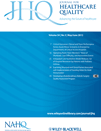
Journal for Healthcare Quality
Transforming health policy with critical insights.Journal for Healthcare Quality, published by Lippincott Williams & Wilkins, serves as a vital platform for disseminating innovative research and insights in the fields of health policy, public health, and medicine. With an ISSN of 1062-2551 and an E-ISSN of 1945-1474, this esteemed journal has been contributing to the improvement of healthcare practices since its inception in 1992. Positioned in the Q3 quartile across its relevant categories as of 2023, it addresses critical issues affecting healthcare quality and policy, demonstrating its commitment to advancing the field. Although it does not currently offer open access, the journal provides researchers and practitioners with an invaluable resource for enhancing their knowledge and practice through peer-reviewed articles aimed at an audience dedicated to improving health outcomes. Located in Philadelphia, the journal continually strives to bridge the gap between research and practical application, making it a cornerstone for those looking to impact healthcare quality.

Family Medicine and Primary Care Review
Empowering healthcare professionals with essential insights.Family Medicine and Primary Care Review, published by TERMEDIA PUBLISHING HOUSE LTD, is a significant open-access journal dedicated to advancing the field of primary care and family medicine. Since its inception in 2006, the journal has fostered an environment for the dissemination of innovative research, clinical practices, and reviews relevant to general medicine, securing its place within the Q4 category in the 2023 journal rankings. With an emphasis on accessibility since 2008, it aims to bridge gaps in medical knowledge and practice, contributing to the global conversation on healthcare delivery. Located in Poland, the journal serves as a valuable resource for researchers, healthcare professionals, and students alike, providing insights and developments that shape the future of primary care. With a Scopus rank of #317 out of 636 in the field of general medicine, it stands as a credible source of information for those committed to improving health outcomes in local and international communities.

Professional Case Management
Advancing healthcare through innovative case management insights.Professional Case Management, an esteemed journal published by Lippincott Williams & Wilkins, serves as a vital resource for researchers, practitioners, and students in the multifaceted fields of nursing and healthcare management. With an ISSN of 1932-8087 and an E-ISSN of 1932-8095, this journal has been at the forefront of disseminating significant findings since its inception in 2007. It covers essential topics including Assessment and Diagnosis, Care Planning, Health Policy, and Leadership and Management, holding a respectable position in the Q3 category quartiles of these areas in 2023. Although not open access, the journal boasts a dedicated readership and provides a platform for contemporary research and innovative practices, evidenced by its competitive Scopus rankings. With objectives aimed at advancing the field and enhancing professional case management practice, Professional Case Management is an indispensable tool for those committed to improving patient outcomes and shaping healthcare policies in the United States and beyond.
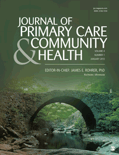
Journal of Primary Care and Community Health
Championing primary care excellence for global health.Journal of Primary Care and Community Health, published by SAGE Publications Inc, is a leading open-access journal dedicated to advancing the understanding and practice of primary care and community health. With an ISSN of 2150-1319 and E-ISSN 2150-1327, it has positioned itself as a vital resource since its inception in 2010, providing a platform for rigorous research that impacts public health and community welfare. Recognized with a prestigious Q1 ranking in both Community and Home Care and Public Health, Environmental and Occupational Health as of 2023, the journal boasts an impressive Scopus rank of #4 among 40 journals in its category, marking it as a top-tier publication in the nursing field. This journal emphasizes the significance of integrating research and practice, fostering a collaborative approach among researchers, healthcare professionals, and students. With open access availability since 2017, the journal ensures that vital findings and innovative practices remain accessible to a global audience, furthering the collective mission of improving health outcomes in communities around the world.

Healthcare
Illuminating pathways to better health through open access.Healthcare is an esteemed academic journal published by MDPI, dedicated to advancing the field of health and medical sciences since its establishment in 2013. Operating from Switzerland, this Open Access journal aims to provide a platform for high-quality research that spans critical disciplines such as Health Informatics, Health Information Management, Health Policy, and Leadership and Management. With a 2023 Impact Factor reflected in its Q3 and Q2 rankings across various categories, Healthcare not only offers visibility and accessibility to innovative research but also fosters collaboration among researchers, professionals, and students dedicated to improving global health outcomes. The journal's commitment to disseminating knowledge and its diverse range of topics make it an essential resource for anyone involved or interested in the continuous evolution of health systems and practices, positioning it as a vital contributor to the future of health research.
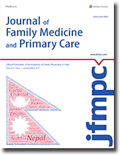
Journal of Family Medicine and Primary Care
Unlocking the Future of Family Medicine TogetherThe Journal of Family Medicine and Primary Care is a premier, peer-reviewed academic journal dedicated to the fields of family medicine and primary healthcare. Published by Wolters Kluwer Medknow Publications, this Open Access journal has been providing a platform for the dissemination of valuable research since 2012, offering researchers, practitioners, and scholars unrestricted access to a wealth of knowledge in primary care practices, policies, and innovations. The journal seeks to bridge the gap between academia and practice by publishing original articles, reviews, and case studies that address contemporary issues in family medicine, thereby enhancing patient care and outcomes. With a commitment to advancing the field, the journal serves as an essential resource for those striving to improve the delivery and effectiveness of healthcare services within families and communities.
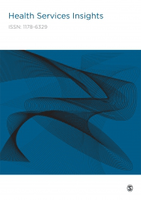
Health Services Insights
Empowering health policy through innovative research.Health Services Insights is a prestigious, open-access journal published by SAGE Publications Inc. Based in the United Kingdom, this journal has become a vital resource for researchers and professionals in the fields of Health Policy and Public Health. Since its inception in 2008, Health Services Insights has consistently aimed to disseminate high-quality, peer-reviewed research that informs practice and policy in health service delivery and management. With an impressive Q1 ranking in both its categories as of 2023, and a respectable Scopus ranking positioning it within the upper percentiles of its fields, the journal continues to attract influential contributions from global experts. Its open-access format, established in 2013, ensures that vital insights on health services are accessible to all, facilitating knowledge sharing and collaboration among researchers, practitioners, and students alike. By focusing on impactful research and innovation, Health Services Insights plays a crucial role in addressing contemporary challenges in health services and improving health outcomes worldwide.